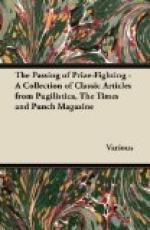Mr. BALFOUR’S reply, in effect, was “What make you here, you little Bulgar boy?” He maintained that, while not as “dull and cautious” as he had meant it to be, the speech referred to in no way bore out Mr. BUXTON’S assertions. Then he proceeded in characteristic fashion to knock together the heads of the pro-Bulgarians and the other Balkan theorists, and declared in conclusion that, while sharing the desire that Bulgaria should come out of the War without a grievance, he was not going to purchase that satisfaction by the betrayal of those who had sacrificed everything they possessed in the cause of the Allies—a declaration which, in view of recent rumours, the House as a whole heard with relief.
Wednesday, October 31st.—No future GILBERT shall be able to write that—
“The House of Peers, throughout
the war,
Did nothing in particular,
And did it very
well,”
for, thanks to the pertinacity of Lord LOREBURN and Lord SELBORNE, their lordships have done something very particular. They have proposed that the PRIME MINISTER shall announce, with any honour conferred, the reasons why he has recommended it, having previously satisfied himself that a contribution to party funds was not one of them. If Lord LOREBURN had had his way the resolution would have been a good deal stronger, but Lord CURZON, upon whose majestic calm this subject has a curiously ruffling effect, refused to allow the retention of words implying that any Minister had ever been a party to a corrupt bargain.
The debate was anything but dull, and some piquant revelations—of course all at second-hand—were made by the highly respectable peers who took part in it. It would have been livelier still if some of the more recent creations could have been induced to tell the full story of “How I got my Peerage.” But they are modest fellows, and unanimously refrained.
Thursday, November 1st.—A full House heard Sir ERIC GEDDES make his maiden speech, or rather read his maiden essay, for he rarely deviated from his type-script. A very good essay it was, full of well arranged information, and delivered in a strong clear voice that never faltered during an hour’s recital. If we were to believe some of the critics the British Navy is directed by a set of doddering old gentlemen who are afraid to let it go at the Germans and cannot even safeguard our commerce from attack. The truth, as expounded by the FIRST LORD, is quite different. Despite the jeremiads of superannuated sailors and political longshoremen, the Admiralty is not going to Davy Jones’s locker, but under its present chiefs, who have, with very few exceptions, seen service in this War, maintains and supplements its glorious record. Save for an occasional game of “tip and run”—as in the case of the North Sea convoy—enemy vessels have disappeared from the surface of the oceans; and “the long arm of the British Navy” is now stretching down into the depths and up into the skies in successful pursuit of them. If the nation hardly realises yet what it owes to the men of the Fleet and their comrades of the auxiliary Services it is because their work is done with “such thoroughness and so little fuss,” and, as Mr. ASQUITH put it, “in the twilight and not in the limelight.”




